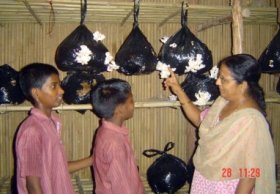 |
MUSHROOM CULTIVATION PROJECT
The Eco-Club of D.T.E.A. Sr.Sec.School, Moti Bagh [II], New Delhi, India, had successfully cultivated a type of edible mushroom “Pleurotus florida” totally on bio-degradable waste like hay, fallen leaves, waste paper, rags, kitchen waste etc. Impressed by their exhibit at the “eco-Club Meet” at the Bal Bhavan on 20&21 Dec 2007, the Department of Environment, Govt of NCT, Delhi awarded the school a project for introducing “Mushroom Culture” in ten Delhi schools. Mrs.Geeta Arunachalam, PGT[BIO] and Eco-club in charge of the school was appointed as co-ordinator of the project who alongwith Mrs. Indira Balan and other members and students of the eco club in the school worked under the invaluable scientific guidance of. Dr.P.N.Chowdhry, retired senior scientist, IARI. Mushroom Culture was taken up as an innovative project by the eco-club of the school. An introduction to the subject was given by Dr.P.N.Chowdhry at a lecture organized in the school premises on September 16 2007. Teacher members of the eco-club and 30 students attended the lecture. A small room was selected for the cultivation. All the students of the school were asked to collect bio-degradable waste material. The spawns were provided by Dr.P.N.Chowdhry. Some students took the spawns home and cultivated mushrooms at home. They were very enthusiastic as no investment is required to start the cultivation. Various Stages In The Cultivation Of Mushrooms· Collection of bio- degradable waste like hay, kitchen waste, rags, papers, saw dust, wood shavings etc. · Sterilisation of the material by boiling or by chemicals. · Addition of spawns to the material and tying it in polythene bags preferably of dark colour. · Placing the bags in a shady place indoors. · Spreading of mycelia and getting ready for fruiting within a month. · Cutting open the bags and placing them on planks or hanging them. . Keeping them moist by spraying water everyday. · Maturing of fruiting bodies within a week. · Three crops can be obtained from one inoculation process. Health Benefits of eating mushrooms· Reduces LDL,Hypertension. · Stimulates immune system. · Anti diabetic. . Good source of Minerals . Reduces incidence of prostate cancer Scope of the Project Starting the cultivation and sustaining it involves negligible investment in terms of money, time, space and other logistics and infrastructure details. This project is highly suitable for empowerment of poor, landless people in rural as well as urban areas. It can be a “Low Investment High Return” venture. | HERBAL GARDEN AT DTEA SCHOOL MOTIBAGH
|